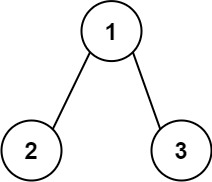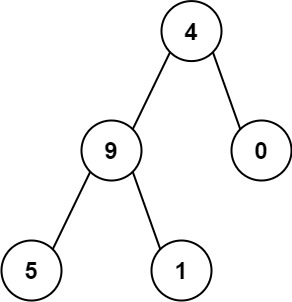LeetCode-in-Go
129. Sum Root to Leaf Numbers
Medium
You are given the root of a binary tree containing digits from 0 to 9 only.
Each root-to-leaf path in the tree represents a number.
- For example, the root-to-leaf path
1 -> 2 -> 3represents the number123.
Return the total sum of all root-to-leaf numbers. Test cases are generated so that the answer will fit in a 32-bit integer.
A leaf node is a node with no children.
Example 1:

Input: root = [1,2,3]
Output: 25
Explanation: The root-to-leaf path 1->2 represents the number 12. The root-to-leaf path 1->3 represents the number 13. Therefore, sum = 12 + 13 = 25.
Example 2:

Input: root = [4,9,0,5,1]
Output: 1026
Explanation: The root-to-leaf path 4->9->5 represents the number 495. The root-to-leaf path 4->9->1 represents the number 491. The root-to-leaf path 4->0 represents the number 40. Therefore, sum = 495 + 491 + 40 = 1026.
Constraints:
- The number of nodes in the tree is in the range
[1, 1000]. 0 <= Node.val <= 9- The depth of the tree will not exceed
10.
Solution
/**
* Definition for a binary tree node.
* type TreeNode struct {
* Val int
* Left *TreeNode
* Right *TreeNode
* }
*/
type Solution struct {
sum int
}
func sumNumbers(root *TreeNode) int {
s := &Solution{sum: 0}
s.recurseSum(root, 0)
return s.sum
}
func (s *Solution) recurseSum(node *TreeNode, curNum int) {
if node.Left == nil && node.Right == nil {
s.sum += 10*curNum + node.Val
} else {
if node.Left != nil {
s.recurseSum(node.Left, 10*curNum+node.Val)
}
if node.Right != nil {
s.recurseSum(node.Right, 10*curNum+node.Val)
}
}
}

